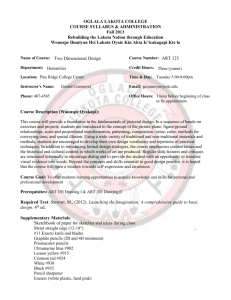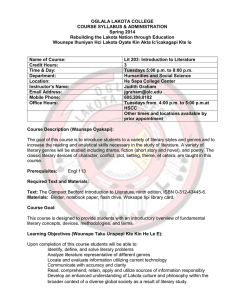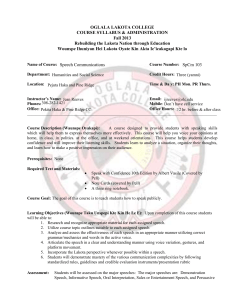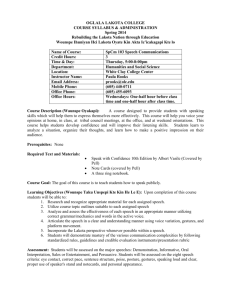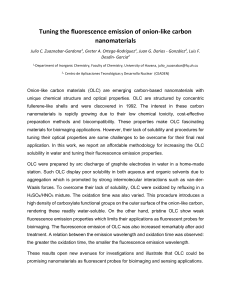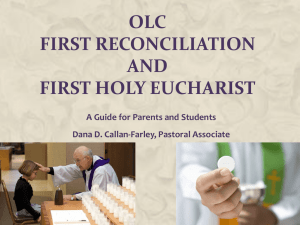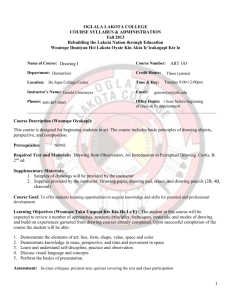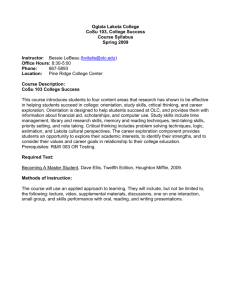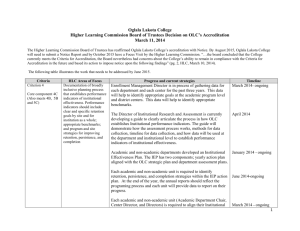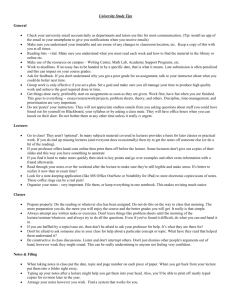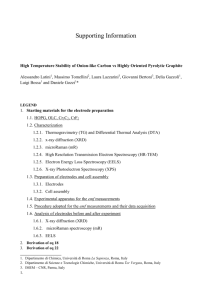JGSPEngl223SyllabusBpgs8-10
advertisement
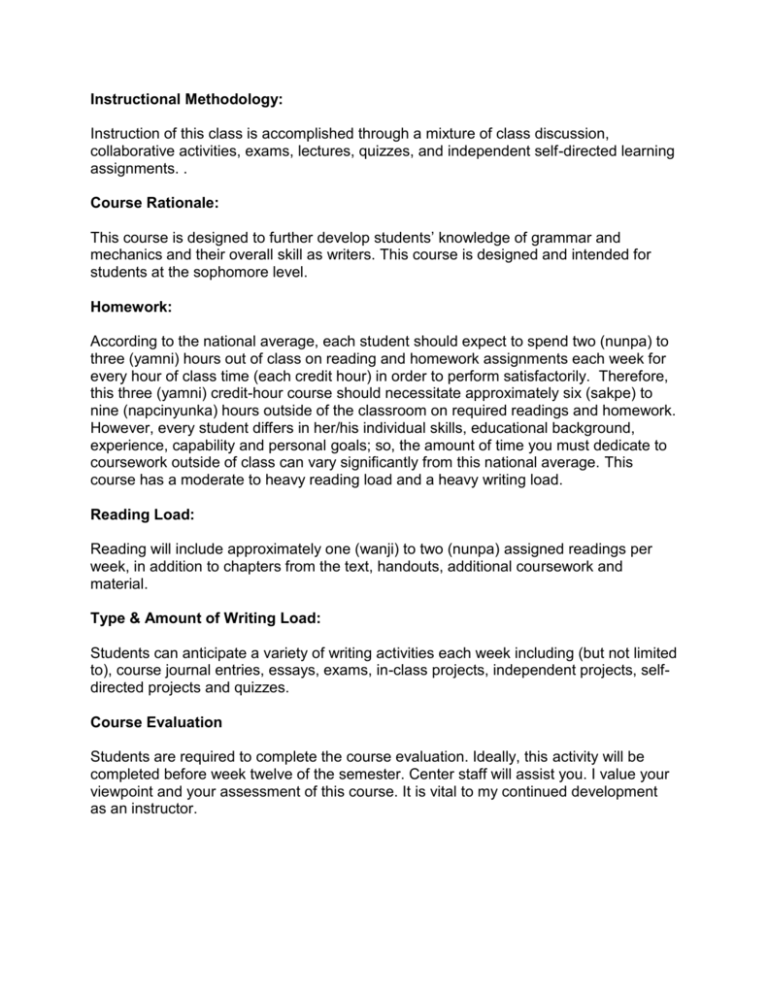
Instructional Methodology: Instruction of this class is accomplished through a mixture of class discussion, collaborative activities, exams, lectures, quizzes, and independent self-directed learning assignments. . Course Rationale: This course is designed to further develop students’ knowledge of grammar and mechanics and their overall skill as writers. This course is designed and intended for students at the sophomore level. Homework: According to the national average, each student should expect to spend two (nunpa) to three (yamni) hours out of class on reading and homework assignments each week for every hour of class time (each credit hour) in order to perform satisfactorily. Therefore, this three (yamni) credit-hour course should necessitate approximately six (sakpe) to nine (napcinyunka) hours outside of the classroom on required readings and homework. However, every student differs in her/his individual skills, educational background, experience, capability and personal goals; so, the amount of time you must dedicate to coursework outside of class can vary significantly from this national average. This course has a moderate to heavy reading load and a heavy writing load. Reading Load: Reading will include approximately one (wanji) to two (nunpa) assigned readings per week, in addition to chapters from the text, handouts, additional coursework and material. Type & Amount of Writing Load: Students can anticipate a variety of writing activities each week including (but not limited to), course journal entries, essays, exams, in-class projects, independent projects, selfdirected projects and quizzes. Course Evaluation Students are required to complete the course evaluation. Ideally, this activity will be completed before week twelve of the semester. Center staff will assist you. I value your viewpoint and your assessment of this course. It is vital to my continued development as an instructor. Lakota Perspective Provided Through: This course stresses Wolakotakiciapi “learning Lakota ways of life in the community.” This course is based on the values of mutual respect and generosity (woohola na wochantognakapi), seeking to advance each individual’s knowledge through her/his continuing hard work (fortitude- wowalitake) and willingness to learn new information and viewpoints as well as demonstrating it by speaking in front of the group (braverywoohitike). All of these values will be undertaken in an environment of trust, integrity, and humility. We will do this by embracing the teachings of our ancestors as we learn new ways. Waunspe wicakiyapi ki iglutanyan ihani unpi kun hena itan waunspe tokeca uha ayin kte. Evaluation and Grading: Learners should anticipate a moderate to heavy reading load and heavy writing load each week throughout the semester. Typically, coursework will consist of class discussions, collaborative activities, course journals, exams, individual information retrieval and research projects, independent projects and quizzes. Personal narrative 10% of your grade Business/grant proposal 10% of your grade Division and classification 10% of your grade Journalism/PSA/Press Release 10% of your grade Process Analysis 10% of your grade Exams and quizzes 10% of your grade Informative/educational report/illustration presentation 10% of your grade Course journals and in class writing assignments 10% of your grade Vocabulary skill enhancement 10% of your grade Grammar/mechanics skill enhancement 10%of your grade Total = 100% A = Superior Quality Work = Demonstrated concept mastery by scoring 90% or better. B = Good Quality Work = Demonstrated concept mastery by scoring 80-89%. C = Satisfactory Quality Work = Demonstrated concept mastery by scoring 70-79%. D = Marginal Quality Work = Demonstrated weak concept mastery by scoring 60-69% F = Demonstrated concept mastery below the acceptable mark of 59%, which is well below what may be required. W = Withdrawal = A student may withdraw from a course by filling out a Drop Card to be recorded by the Registrar. College Policy on Grading and Change of Grades: http://www.olc.edu/~wwhitedress/studentservices/Docs/OLC_Handbook.pdf Course Requirements, Expectations of Students: Because OLC offers classes in three-hour blocks once per week (for everyone’s travel convenience), if you are absent from one OLC class session, it’s like missing three classes at another college. (Refer to the student handbook). Unannounced quizzes and graded in-class activities and exercises will be given; content can include any course material assigned up to and including the current session. Your homework assignments must be turned in on the dates due to earn full credit. You are expected to participate in class discussion and collaborative activities; doing so provides evidence of your interest in and preparation for class. Also, active participation helps gauge the effectiveness of instruction and everyone’s level of comprehension of the material. Most importantly, fellow class members benefit from your opinions and insights. In addition, the questions you ask may be about the same topic with which other students are having difficulty. By helping yourself, you are helping them as well. If the instructor is not present at the beginning of the class, and the college center staff has not heard from the instructor, students should wait at least 30 minutes past the normal start-time. If the instructor has not arrived after 30 minutes, students may leave. Attendance and Tardiness http://www.olc.edu/~wwhitedress/studentservices/Docs/OLC_Handbook.pdf Policies on Academic Honesty http://www.olc.edu/~wwhitedress/studentservices/Docs/OLC_Handbook.pdf Standards of Conduct Policy http://www.olc.edu/~wwhitedress/studentservices/Docs/OLC_Handbook.pdf ADA Policy This class requires extensive reading and writing. If you have a disability preventing you from taking part in any class activities, please talk to the instructor. Do this as soon as possible. If you’re uncertain if your writing and/or reading skills are sufficient for this course, please contact the instructor immediately to determine whether or not you need assistance. If you are unable to complete the coursework, please contact the instructor. Additional information outlining Oglala Lakota College’s ADA policy can be accessed via the link listed below http://www.olc.edu/~wwhitedress/studentservices/Docs/OLC_Handbook.pdf Electronic Information Resources Acceptable Use Guidelines http://www.olc.edu/~wwhitedress/studentservices/Docs/OLC_Handbook.pdf see TOPICAL CONTENT Date Oko Wanci (Class 1) 01.22.2014 Objectives Class introductions (instructor and students) Course syllabus overview and confirmation Overview of course text and basic materials including Woksape Tipi (OLC Library) card applications Review of sample course journal entries Discussion of English and Communication Studies degrees and programs of study offered by the Humanities department Assignments Read and review course syllabus. Complete and return syllabus confirmation. *Once the text arrives at the OLC bookstore, we will add the text’s corresponding pagination to each week’s activities and coursework.* Review the course text, et cetera. Complete course journal entry for week one. Degree majors will complete and submit program applications. Oko Nunpa (Class 2) 01.29.2014 Nouns Pronouns Adjectives incl. articles and demonstratives Prepositions Balanced writing techniques Publisher’s resources for students OLC resources for student writers TJC writing contest SP2014 AIHEC competitions SP2014 Literary magazine Discussion of the personal narrative format. Review of four parts of speech from last week. Capitalization Review What is syntax? Alliteration Assonance Discussion of journalism activity. Vocabulary exercise Complete course journal entry for week two. Personal narratives due next week. Oko Yamni (Class 3) 02.05.2014 Oko Topa (Class 4) 02.12.2014 Verbs Adverbs Punctuation review Complete course journal entry for week three. Personal narratives due this week. Journalism activity due next week. Degree majors anticipating degree completion during 2014 will complete preliminary course requests for F2014. Complete course journal entry for week four. Journalism activity due. Oko Zaptan (Class 5) 02.19.2014 Oko Sakpe (Class 6) 02.26.2014 Clarity, specificity, being concise “Introduction to Time Management Concepts Discussion of business/grant proposal Vocabulary exercise Conferences Review of two parts of speech from last week. Conjunctions Metaphor Simile Continuity Grammar review Vocabulary exercise Discussion of Process analysis Continued discussion of process analysis Business/grant proposal due next week. Degree majors will complete individual plans of study. Review of parts of speech from last week. Modifiers Strategies for coherent, cohesive writing Hyperbole Personification Allusion Vocabulary exercise Complete course journal entry for week six. Process analysis assignment due. Complete course journal entry for week five. Business/grant proposal due. Process analysis assignment due next week. Oko Sakowin (Class 7) 03.05.2014 Oko Saglogan (Class 8) 03.12.2014 Oko Napcinyunka (Class 9) 03.19.2014 Review and preparation for midterm activities. Individual conferences Complete course journal entry for week seven. Midterm activities Midterm activities, no new assignments due this week. Oko Wikcemna (Class 10) 04.02.2014 Idioms Personification Vocabulary exercise Student presentations Conjunctions Clarity Onomatopoeia Synecdoche Imagery Discussion of midterm. Vocabulary exercise Discussion of student presentations. Complete course journal entry for week nine. Student presentations are due next class session. Complete course journal entry for week ten. Student presentations are due. Request the presentation Oko Ake Wanci (Class 11) 04.09.2014 Transitive/intransitive verbs review Active and passive voice/sentence structure Symbolism Antithesis, Idioms Vocabulary exercise Discussion of division and classification. Oko Ake Nunpa (Class 12) 04.16.2014 Vocabulary exercise Course evaluations Individual conferences Oko Ake Yamni (Class 13) 04.23.2014 Oko Ake Topa (Class 14) 05.01.2014 Oko Ake Zaptan (Class 15) 05.08.2014 Comprehensive course review. Final activities preparation Final activities rubric if you don’t have a copy. Degree majors will complete their preliminary program advising for F2014 enrollment. Complete course journal entry for week eleven. Division and classification due next week. Complete course journal entry for week twelve. Division and classification due this week. Complete course journal entry for week thirteen. Revision of coursework. Complete course journal entry for week fourteen. Revision of coursework. Final activities Pot luck Program majors will finalize their F2014 enrollment and update their status sheets.
